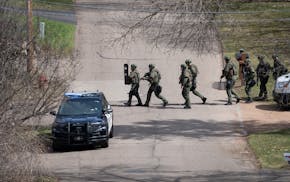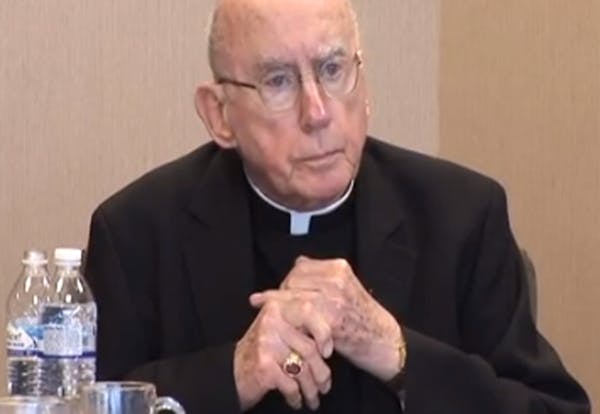The Rev. Timothy McCarthy was the "kids' pastor" who wore sneakers under his vestments and dropped profanities into his sermons. Girls had crushes on him, and parents let their children go camping with him.
When McCarthy abruptly resigned the priesthood in 1991, he told his flock at the Church of the Most Holy Redeemer in Maplewood that he had outgrown Catholic Church dogma. He was quitting, he said, to go down a new spiritual path.
But newly released files reveal that the church ousted McCarthy after allegations that he sexually abused two boys early in his career and later engaged in an exploitative sexual relationship with a college student. Despite those concerns, the church helped McCarthy gain credentials that allowed him to work closely with teenagers and young adults. He later lost his job as a Hennepin County correctional officer after being accused of criminal sexual conduct with a 17-year-old.
McCarthy's previously hidden history is laid out in documents that the Archdiocese of St. Paul and Minneapolis divulged under an order from a Ramsey County district judge in a clergy sexual abuse lawsuit brought by St. Paul attorney Jeff Anderson. The court order has triggered the release of more than 70,000 pages of classified memos about more than 45 accused priests — and could bring more litigation under a change in Minnesota law that allows people to bring claims of long-ago abuse.
The McCarthy case goes to the heart of accusations that have been leveled against church leaders since the sex abuse scandal erupted late last summer: The archdiocese didn't disclose complaints to law enforcement or parishioners, even as they moved priests from church to church. In many instances, archdiocesan leaders continued to provide financial support for many accused priests or helped them gain other employment without ever disclosing abuse complaints.
In McCarthy's case, records show that a psychologist hired by the archdiocese concluded that the sexual misconduct that finally led to his removal was borderline criminal, but there's no indication that police were ever called.
Church: New standards now
Bishop Andrew Cozzens said church officials who managed McCarthy's priesthood are gone or no longer in position to make the kind of decisions that kept McCarthy in ministry. Today's standards would have halted McCarthy early in his career and informed parishioners, Cozzens said.
Also, "We would not recommend a priest who had been credibly accused of sexual contact with a minor to go into counseling of minors," he said.
McCarthy, reached at his home in Landfall, said he disagrees with the release of his file. "We have no crime," he said. "There is no crime." Now 67 and collecting an archdiocesan pension, McCarthy said he had no interest in answering questions.
Cozzens said the priest has denied abuse allegations — a factor in Archbishop John Nienstedt's decision not to push for his involuntary removal from the priesthood. "At this point, he is prohibited from functioning as a priest and will never return to ministry," Cozzens said.
Officials at the University of St. Thomas, where McCarthy counseled students while in graduate school, and the Minnesota Board of Social Work say the archdiocese never warned them that McCarthy faced a criminal probe and was sent to a year of treatment as a consequence.
"If McCarthy applied today and we were aware of this information, we would not accept him," university spokesman Doug Hennes said.
The former priest who supervised McCarthy's counseling work, according to state records, said he also was unaware of that past when he strongly recommended McCarthy for social work licensure.
McCarthy's social work license, his outwardly unblemished record as a priest who worked with young people and his counseling experience would have helped his 1992 application to become a juvenile correctional officer in Hennepin County, said Craig Riggs, who now heads the Juvenile Detention Center.
"That would have been enough to get his foot in the door," Riggs said.
In 1999, seven years into his county job, McCarthy was charged with a felony for allegedly having sex with a 17-year-old boy at the Hennepin County Juvenile Detention Center. McCarthy was acquitted, but the county fired him for "repeated inappropriate physical contact" with the boy, his dismissal notice said. McCarthy protested, but the state Court of Appeals sided against him, writing that his behavior demonstrated a "shocking disregard of his duties and obligations."
Early warnings
The first sign of trouble in McCarthy's priest personnel file was a May 1982 memo to then-Archbishop John Roach. The county attorney and sheriff of Le Sueur County said a 16-year-old boy from St. Andrew's Church in Elysian had passed a lie-detector test in describing "homosexual activity" with McCarthy at the church rectory, a cabin and a motel near Milaca. A boy from Lakeville, the place of McCarthy's previous assignment as a priest, also was involved, the memo said.
There were no criminal charges, but the officials wanted the archdiocese to remove McCarthy. "They want him in a treatment program and out of the area," the Rev. Robert Carlson wrote.
Church documents include a follow-up report that said McCarthy admitted to having a "sexually inappropriate relationship" with the 16-year-old and that he completed a related year of treatment in Massachusetts. The archdiocese did not notify parents in Elysian or Lakeville because charges weren't filed, a memo in the file said.
McCarthy finished treatment in November 1983, and Roach placed no restrictions in assigning him to a new parish in Lake Elmo early in 1984. Moreover, he recommended McCarthy for a master's degree program at St. Thomas that would allow him to add psychological counseling to his ministry, the file shows.
"I'm delighted you are back in the archdiocese," Roach wrote to McCarthy. "I know the last couple of years have been very difficult for you."
Four years later, in the fall of 1987, McCarthy was providing counseling and psychotherapy to students at St. Thomas as an intern at the school's Personal Counseling Center. A freshman recognized him as her former pastor — a priest who was a heartthrob to teenage girls, she would later say.
Two lengthy memos in McCarthy's file tell how the student would drop by his counseling office to say hello, at least once getting advice about turmoil she was in. McCarthy was still a pastor, but they started dating and soon they were regularly having sex, the memos said.
The personnel file indicates that McCarthy did not disclose this activity in a 1988 checkup the archdiocese conducted on priests accused of sexual misconduct. But in December 1990, the woman went to the Rev. Kevin McDonough, then vicar general for the archdiocese, with concerns that McCarthy had exploited her.
The archdiocese hired Gary Schoener, the psychologist who assessed McCarthy in 1988, to review the woman's story and reassess McCarthy. Schoener reported that the woman said McCarthy told her he once had gonorrhea and he took her to a clinic to be checked for "VD."
Schoener said that McCarthy "basically acknowledged the accuracy of the story." He reported telling McCarthy that the sex could have been criminally exploitative under laws prohibiting counselors and priests from having sex with advises or parishioners.
"McCarthy constitutes a risk to parishioners," Schoener concluded, and "represents a potentially great liability legally" to the archdiocese.
The Rev. William Kenney, the archdiocese's priest personnel director, had written to the Social Work Board in support of McCarthy's application in April 1990 and no updates were ever made.
Now retired, Kenney said in an interview he was not aware of any concerns about McCarthy. "I was not privy to that," he said.
State records indicate that McCarthy won Licensed Graduate Social Worker status in late March 1991, four months after McDonough learned of McCarthy's actions with the college student.
No disclosure
While McCarthy was explaining his departure as a conflict with dogma, McDonough's memos made clear that Roach had demanded the priest's resignation.
"As I understand it, it is clear to all of us that Father McCarthy is incapable of being trusted in a parochial setting," McDonough said in the Aug. 14, 1991, memo.
Just days earlier, a female employee at Holy Redeemer had complained to Roach that McCarthy had been harassing her with lewd and sexual remarks. She asked if the archdiocese was going to report McCarthy to state licensing officials "to prevent him from working as a counselor."
The archdiocese quickly settled with the woman for $13,191.88. At the same time, McCarthy permanently was removed from ministry under terms that paid him twice the normal amount of severance money, church memos said. Kate Zacher-Pate, who heads the state Social Work Board, said the archdiocese never relayed any complaints against McCarthy.
'Swept under the rug'
McCarthy was out of the priesthood in late 1997 when a 34-year-old Waseca man, near death from "alcohol dependence syndrome," confided to a relative that McCarthy had abused him as a child, a memo in McCarthy's file said.
Contacted recently by the Star Tribune, the dead man's mother said her son and other boys from Elysian went camping with McCarthy in the early 1980s. They made a pact not to tell of the abuse they suffered and none has ever filed a lawsuit, she said.
"It's horrible to find out some of the things that went on inside your church," she said. "They swept it all under the rug."
She took her son's story to McDonough, pushing for disclosure. "As she said it to me: 'If I had known this part of what was wrong with him, maybe I could have helped my son before he drank himself to death," McDonough wrote in a memo.
The file contains McDonough's memos with concerns that McCarthy's bosses in Hennepin County might be unaware of his background.
Still, as recently as 2010, the church did not disclose the reasons for McCarthy's departure from the priesthood.
At that time, McCarthy had been found guilty of a tax-cheating scheme, and the U.S. District Court had asked the church to verify his employment. The archdiocese replied only that McCarthy "gave up the priesthood" in 1991.
McDonough was more blunt in his sworn testimony in the clergy abuse case in April.
"He left when we drove him out in — in 1991," McDonough said. "I'm very proud of that. I — I lobbied heavily for that to happen."
Tony Kennedy • 612-673-4213

FAFSA completions in Minnesota drop amid flawed efforts to update form

Wisconsin Republicans ignore governor's call to spend $125M to combat 'forever chemicals'

Man killed in Minnetonka by law enforcement started gun battle with deputies, BCA says

